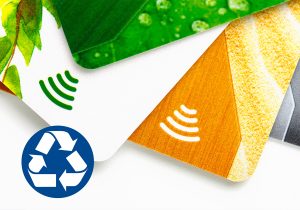 Eco-friendly materials for card bodies have become a sustainability trend. In 2022, more than 100 million payment cards manufactured from non-first-use PVC were expected be issued. This number is predicted to grow to 30% of the global payment card market in 2025.
Eco-friendly materials for card bodies have become a sustainability trend. In 2022, more than 100 million payment cards manufactured from non-first-use PVC were expected be issued. This number is predicted to grow to 30% of the global payment card market in 2025.
Thomas Decker, vice president, product marketing, finance at Linxens and a member of the International Card Manufacturers Association (ICMA) discusses eco-friendly card body materials and provides an outlook on industry trends and certifications. Although the focus is on the payment card industry, this information may serve as guidance for other card segments too.
Eco-Friendly Card Body Materials
While PVC is inexpensive and easy to process, it does have some disadvantages including:
- Depletes fossil resources, which are not renewable.
- Contains chemical components, which are hazardous to our environment.
- Limitations in recycling when it comes to a full circularity.
Instead, consider the following eco-friendly card body materials:
- Recycled PVC (rPVC): A quick and easy “entry solution” and “first aid” for the environment, this recycled substrate is made from post-industrial waste. Typically, it’s created by employing plastic waste from the packaging and printing industries. Cards can contain up to 95% less first-use PVC.
Polyethylene terephthalate glycol (PETG & rPETG): While preparing the way to full circularity, PETG avoids toxic substances. It’s a thermoplastic polyester commonly used in manufacturing. It’s also available as mechanically recycled material—rPETG. Established chemical recycling chains, converting used PETG into 100% virgin PETG, allows for an endless circularity.
- Polylactic Acid (PLA): Saving limited fossil resources, this is a thermoplastic aliphatic polyester derived from renewable resources such as corn starch. Compared to petroleum-based PVC cards, PLA card production and disposal uses significantly less energy and causes considerably fewer pollutants. Composted under industrial conditions, they don’t pollute the environment with plastic waste.
- Ocean-sourced plastic: This enables the reduction of first-use plastic, while diverting plastic from entering the ocean.
- Wood: Unique top-of-wallet wood-based products from renewable resources can assist with climate change mitigationby storing carbon, while helping to avoid or reduce the greenhouse gas emissions associated with the materials for which they substitute. They include plastics, concrete, steel and synthetic fibers.
Eco-Friendly Card Industry Trends
According to recent statistics on millennials:
- 84% feel that it’s their duty to make the world a better place.
- 88% would like brands to help them to be more environmentally friendly and ethical in their daily life.
Sustainability is a general trend across all industries. The card manufacturing industry can be considered more as a follower, than a trendsetter. However, it’s the industry’s obligation to make the card a more sustainable product to contribute to the environment and not just to fulfill client expectations.
Currently, there’s a very strong focus on rPVC. This is due to its low cost, good availability and ease to process. However, in the future, we’ll see a much higher diversification regarding card body materials.
Banks already have recognized that being environmentally responsible can be an effective marketing tool. This is especially true for materials like ocean-sourced plastic or wood, which carry a great marketing story and top-of-the-wallet effect with the end customer.
In the interim, new bio-sourced materials that degrade in our normal environment will be used. This is compared to today’s materials, like PLA, which require some very specific industrial conditions to do so.
For other materials, like PETG or rPETG, there will be full circularity setups. Materials will be converted into “virgin” material again, via chemical or enzymatic processes. Practically, this will mean the possibility of an endless recycling cycle without downgrading the material. This must be considered as the ultimate goal of any recycling process.
Eco-Friendly Card Industry Certifications
Through its EcoLabel Standard Program, ICMA has been leading recognition for sustainability in the card manufacturing industry. The voluntary program initiates measurable criteria for assessing the environmental impact of cards and conforms with global ISO principles for environmental labeling. This certification validates third-party credibility of card manufacturers’ claims that a product is an environmentally preferable alternative.
Mastercard established a program focused on the payment card industry, the Card Eco Certification (CEC) program. It examines a variety of different environmental aspects and not just the carbon footprint. The CEC evaluation of a product looks at hazardous substances, use of fossil versus renewable resource, water and energy consumption, along with what kind of energy is used.
Like Mastercard’s Card Quality Management (CQM) program, the CEC program has the potential to become a reference standard outside the banking card industry. For example, it’s not unusual that cards for public transport are tested against Mastercard CQM specification. In the same way, a Mastercard CEC evaluation could be applied for a hotel keycard, as an example.
Additionally, there are numerous independent and accredited certification bodies that a card manufacturer can use to certify their production process and supply chain.
In closing, sustainability has become a sustainable trend itself. In the past two years, it finally has fully arrived in the card manufacturing industry as well. While serious efforts have been shown already, there’s still a way to go. More efforts on the material, production, supply chain and recycling side will be required to continue the success story of the ISO card, in a world where sustainability has become vital.
If you’re interested in learning more about The State of Play, attend the presentation at the ICMA EXPO on May 16 at 11:15 a.m. Find the full agenda at ICMAEXPO.com.
More Insights on Card Trends
For more than 30 years, ICMA has represented the interests of the card manufacturing industry—which includes manufacturers, personalizers, issuers and suppliers—as its leading global association.
Throughout the year, ICMA members have the opportunity to share insights and knowledge by giving presentations during ICMA webcasts and events. The association’s main event is its annual Card Manufacturing & Personalization EXPO. The 2023 EXPO will take place from May 15-18 in Orlando, Florida.
ICMA offers regular educational opportunities, including ACE-Manufacturing, ACE-Personalization and ACE-Advanced Technologies training and exams at the ICMA EXPO. ICMA also offers ACE-Commercial training, which provides sales, marketing, customer service and other key personnel at ICMA member companies with the opportunity to learn the fundamentals of card manufacturing. In 2023, ACE-Commercial trainings will take place on June 14, September 6 and November 1.
Learn more about the benefits of ICMA membership.
